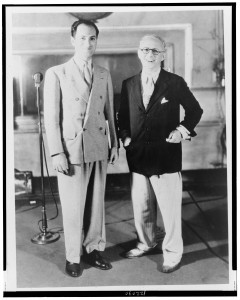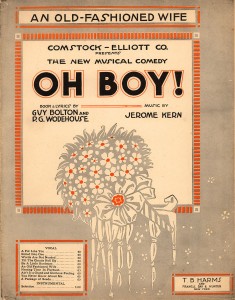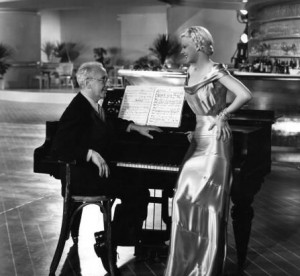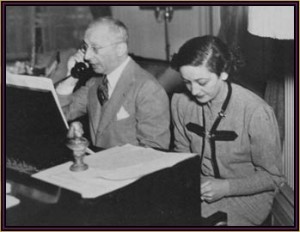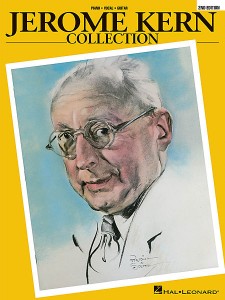Where did Broadway show music start? Many believe that it all started with Jerome Kern. Kern, who would write more than 700 songs which would be heard in over 100 musicals, was one of the most important popular composers of the 20th century. Kern was born in New York City on January 27, 1885 and grew up on east 56th Street. His mother, who was an accomplished musician, taught him how to play the piano. In 1902, Kern studied piano and harmony at the New York College of Music. From 1903 to 1905, he also studied music in Germany. His formal training prepared him for his vocation and his being born and raised in New York connected him with the people, rhythms, and theatre of New York. He was a composer in the right place at the right time.
Early and Important Moments
In his early years, Kern was rehearsal pianist for Broadway shows and also a song-player and plugger on Tin Pan Alley. At the same time, he was composing songs and at times when a Broadway show was in need of a new tune, Kern would have on hand a few of his that he could offer. He was also under contract to producer Charles Frohman to provide new songs to Broadway shows when they were produced in London.
Between 1915 and 1920, Kern composed the scores for 16 Broadway musicals. Plus, he wrote many more songs for variety, other Broadway shows, and silent films. During this time, his scores for what were called The Princess Musicals were his most important works. Kern teamed up with Guy Bolton and P.G. Wodehouse to create a string of new musicals for the intimate 299-seat Princes Theatre. The lack of stage spectacle in these musicals allowed Kern and his writing partners to focus their energies on creating musicals with strong stories, realistic characters, and songs that were motivated by the story. The Princess Musicals were a great proving ground for the composer.
Kern’s teaming up with lyricist/librettist Oscar Hammerstein II in the mid-1920s was legendary. Together the composer and lyricist/librettist would create the first Broadway musical that fully integrated song, lyrics, and libretto. That show was Show Boat, which premiered in 1927, and had a long run on Broadway. In that musical, Kern offered songs that fit character, situation, and period precisely.
Ironically, in the 1930s much of Kern’s success came in Hollywood where he began writing for films. He composed many hit songs for some of the biggest movies and stars of the era, while still being involved in Broadway shows. For the Astaire-Rodgers film Swing Time, Kern wrote various hit songs with lyricist Dorothy Fields including “The Way You Look Tonight,” which won the Academy Award for Best Song in 1936.
What Made Kern Great
Jerome Kern was a master at writing melodies that were seamless. Consider the tunes to numbers such as “Ol’ Man River,” “Smoke Gets in Your Eyes, “ and “I Won’t Dance.” These are vintage Kern. Along with having memorable melodies, Kerns songs progress musically in a manner that allows for the development of emotion in the character or characters who are singing them. The tunes appear to develop effortlessly, transitions and bridges are finely executed, and by being adaptable in terms of musical style, his songs ably match period, situation, and character. At the same time, he was able to compose songs with complex effects of counterpoint that added richness to his works.
A Humble Man
Composer Jerome Kern was a humble man. He often said that he was a “musical clothier- nothing more or less” and claimed that there were many more talented composers writing for Broadway than he. But despite the fact that Kern was a modest man, one cannot overlook his importance in the 1920s and in the 1930s. In Hollywood in the ‘30s, he wrote some of his greatest songs and on the cusp of the ‘30s with Hammerstein he gave us the ever-important Show Boat.
In Part II of Great Composers of the 1930s we consider the contributions of Irving Berlin. Berlin, who was largely untrained as a musician, composed the music and wrote the lyrics to songs that defined the American experience. He was one of a kind and a true American talent.

